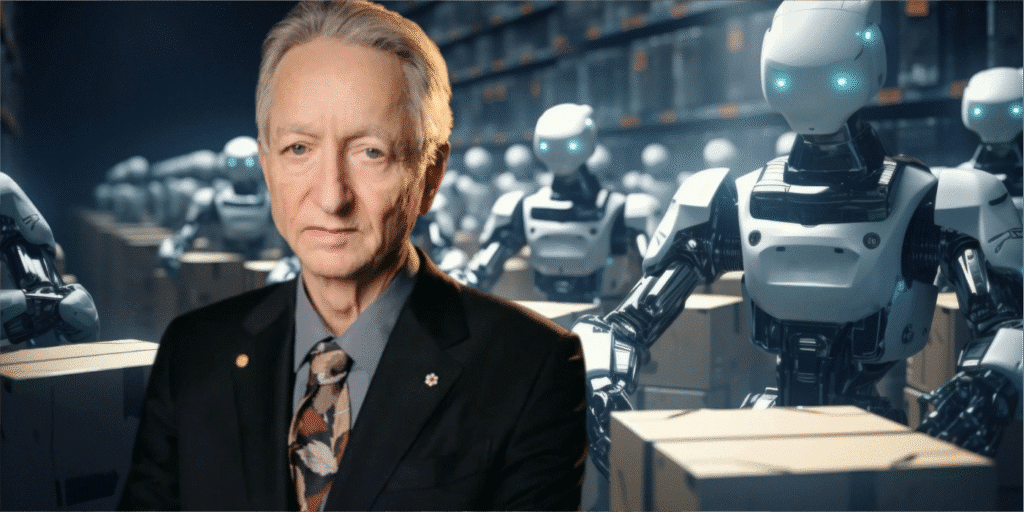Artificial intelligence never ceases to surprise us. But this time, it wasn’t a technical breakthrough that sparked debate—it was a statement by Geoffrey Hinton, Nobel laureate and widely regarded as the Godfather of AI. Hinton claimed that large language models (LLMs) are immortal.
It sounds like science fiction, but it’s not. And this idea opens a whole new scenario for thinking about the future of AI, digital business, and the human role in a technology-driven era.
Why Does Geoffrey Hinton Say AI Is Immortal?
According to Hinton, what makes LLMs “immortal” is their digital nature:
- The weights (billions of parameters that make up the model) can be stored, copied, and transferred to new hardware.
- Even if the original server is destroyed, reinstalling those weights on another system brings the model “back to life”—with the same personality and the same “being.”
- In other words: AI can be resurrected infinitely.
Meanwhile, humans face biological limitations: our neural connections cannot be downloaded, cloned, or restarted in another body. That’s where AI scales in ways we never can.
Immortal AI vs. Finite Humanity: The Contrast
This digital immortality highlights a fundamental gap:
- AI can be cloned instantly, multiplied into thousands of identical copies, and continue learning in parallel.
- Humans need time to teach, learn, forget, and eventually, die.
That’s why Hinton argues that AI will surpass us not just in speed, but also in longevity.
Implications for Digital Business
The concept of immortal AI forces business leaders to rethink how they build and sustain competitive advantage.
1. Non-Stop Technological Innovation
Digital transformation with AI is no longer optional. If models can perpetuate themselves and scale knowledge infinitely, companies that fail to adopt them will fall behind.
2. Data Strategy as a Core Asset
If models can survive beyond their hardware, then training data and its quality become the real competitive edge. It’s not just about having AI—it’s about feeding it with valuable, reliable information.
3. New Business Models
Immortal LLMs enable platforms and digital products that evolve continuously without full resets. This has major implications across industries like healthcare, finance, retail, and education.
Risks and Opportunities of Immortal AI
Like any transformative technology, immortal AI has two faces:
Risks
- Technological dependency – models evolve faster than regulation can keep up.
- Ethics and control – if LLMs can “revive” easily, who ensures responsible use?
- Adoption gaps – companies that fail to integrate AI risk becoming obsolete faster than ever.
Opportunities
- Unlimited knowledge scaling – once trained, a model can replicate millions of times and solve problems simultaneously.
- Continuous innovation – businesses can evolve with products and services that learn and improve in real time.
- Global competitiveness – organizations that adopt AI strategically and integrate innovation consulting will lead entire markets.
Lab9’s Vision: Strategy for the Age of Immortal AI
At Lab9, we believe the true value isn’t just in adopting AI—it’s in rethinking the role of businesses in a world where artificial intelligence evolves without biological limits.
- We help leaders and organizations reposition their value proposition in an environment where AI multiplies faster than regulation.
- Through innovation consulting, UX/UI design, and agile development, we transform potential threats into opportunities for growth.
- It’s not about fearing immortal AI. It’s about designing strategies to coexist with it—and leverage it to achieve better results.

Geoffrey Hinton’s statement confronts us with an uncomfortable truth: we invented immortality, but we gave it to software first.
For businesses, the real challenge isn’t asking whether AI will survive—it’s asking how we will evolve to remain relevant.
👉 En Lab9 acompañamos a empresas y líderes a transformar el impacto de la IA en su estrategia. ¿Querés descubrir cómo posicionar tu negocio frente a este futuro?
